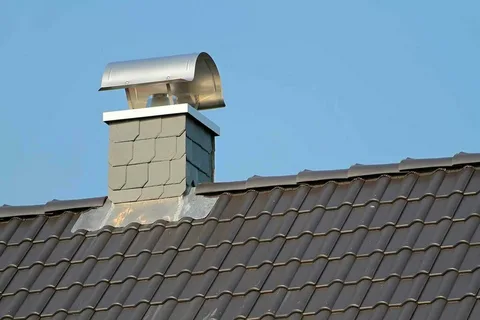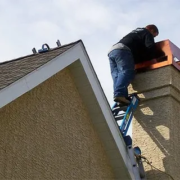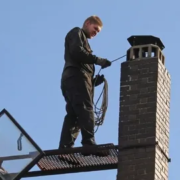Which Tulsa Chimney Liner & Firebox Repair Is Right?
When the moment comes to retrofit your chimney and ensure your fireplace is safe and efficient, Tulsa homeowners ask themselves: Which Tulsa chimney liner & firebox repair is right? Choosing the right renovation or repair will prevent danger, optimize heat efficiency, and extend the lifespan of your fireplace. We’ll walk you through it all today—liner and firebox repair Tulsa material, cost considerations, and professional tips.
Getting to Know Chimney Liners
A chimney liner is not only a fireproof sleeve within your chimney but a critical part of your home that protects against fire, smoke, and harmful gases such as carbon monoxide. Liners also improve heating efficiency by directing heat and smoke in the right direction.
Kinds of Chimney Liners
| Type of Liner | Material | Pros | Cons | Ideal Use |
| Clay Tile Liner | Ceramic | Heat resistant, durable, inexpensive | Fragile, may crack with age | Masonry fireplaces |
| Stainless Steel | Metal | Durable, corrosion-resistant, flexible | High cost | Gas, wood, or pellet fireplaces |
| Aluminum | Metal | Lightweight, easy to install | Not for heavy wood burning | Gas fireplaces only |
| Cast-in-Place | Cement/Clay | Seamless, custom fit | Labor-intensive, costly | Older chimneys needing rebuilding |
Knowing your chimney type and usage helps determine which liner is best. For heavy wood use, a stainless steel liner is often recommended for durability and resistance to creosote buildup.
Firebox Repair: What You Need to Know
The firebox is the heart of your fireplace—the area where fire actually burns. Over time, cracks, worn bricks, or damaged mortar can compromise both safety and efficiency.
Typical Firebox Issues
- Cracks in firebrick or mortar – Can transfer heat to surrounding walls.
- Spalling bricks – Flaking or crumbling bricks due to heat or moisture.
- Improper slope or hearth damage – Can cause smoke backflow and reduced efficiency.
Firebox Repair Choices
| Type of Repair | Explanation | Cost (Tulsa) |
| Repointing | Replace damaged mortar between bricks | $200–$600 |
| Firebrick Replacement | Replace cracked or missing bricks | $300–$1,000 |
| Full Firebox Rebuild | Reconstruct entire firebox | $1,500–$5,000 |
| Heat-Resistant Coatings | Apply protective coatings to prevent damage | $150–$400 |
Which Tulsa Chimney Liner & Firebox Repair Is Best for You?
Consider These Factors
- Age of Fireplace: Older fireplaces may need full liner replacement or firebox rebuild.
- Frequency of Use: High-usage fireplaces benefit from durable liners like stainless steel.
- Type of Fuel: Wood, gas, or pellet use determines ideal liner material.
- Budget: Minor repairs plus liner replacement can often be cost-effective.
- Safety Risks: Cracks, leaks, or inefficient liners increase fire and carbon monoxide hazards.
Professional vs. DIY
While minor cosmetic repairs can sometimes be done by homeowners, most firebox and chimney liner work requires professionals. Tulsa-licensed chimney experts ensure your fireplace is safe, efficient, and up to code.
Maintenance Tips for Longevity
- Annual Inspection: Get your chimney inspected every year.
- Regular Cleaning: Remove creosote and soot buildup to prevent fires.
- Repair Small Cracks Early: Avoid more costly repairs later.
- Monitor Liner Integrity: Check for rust, corrosion, or cracked tiles.
- Keep the Area Dry: Moisture is a primary cause of brick and mortar deterioration.
Cost Comparison Table: Firebox vs. Liner Replacement
| Service | Low-End Cost | High-End Cost | Typical Lifespan |
| Clay Tile Liner Installation | $1,000 | $3,000 | 50+ years |
| Stainless Steel Liner | $1,500 | $4,000 | 40+ years |
| Firebox Repointing | $200 | $600 | 10–20 years |
| Full Firebox Rebuild | $1,500 | $5,000 | 20–30 years |
FAQs
Q1: How will I know if my chimney liner needs to be replaced?
A: Signs include cracks, developing gaps, poor draft, smoke backflow, or discoloration inside the chimney.
Q2: Do I need a professionally installed firebox liner?
A: Yes. Chimney liners and fireboxes require professional installation due to fire and carbon monoxide safety codes.
Q3: How long will it take to repair a firebox?
A: Minor repairs can be done in a few hours; a full rebuild may take 2–5 days depending on size and complexity.
Q4: Will repairing my firebox improve heating efficiency?
A: Yes. Repairs improve heat retention, smoke flow, and overall energy efficiency.
Q5: How often should I have my chimney cleaned in Tulsa?
A: At least once a year, ideally before winter.
Conclusion
Choosing which Tulsa chimney liner & firebox repair is right depends on your fireplace’s age, fuel type, usage, and safety needs. Whether it’s a minor firebox repair or a full liner replacement, hiring a licensed Tulsa chimney technician ensures long-term efficiency, safety, and comfort. Proper material selection, timely repairs, and regular maintenance will make your fireplace a safe, warm centerpiece for your home for years to come.
Read more Chimney Liner Tulsa





Leave a Reply
Want to join the discussion?Feel free to contribute!